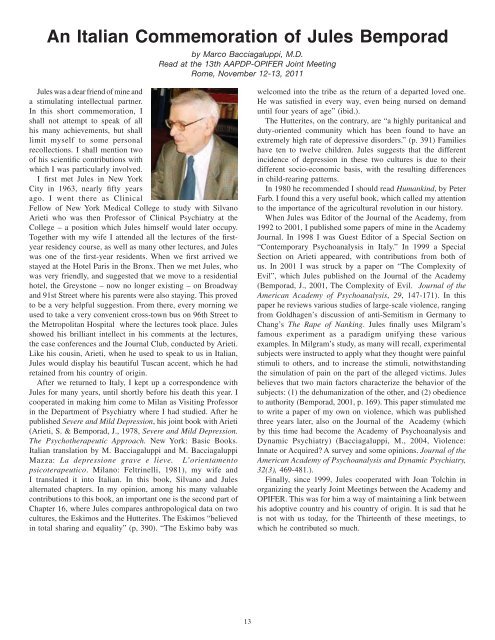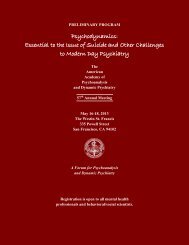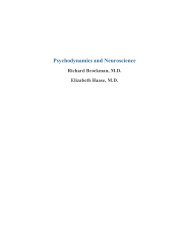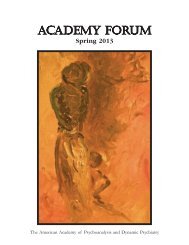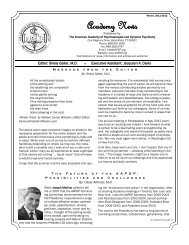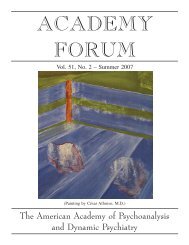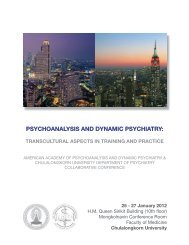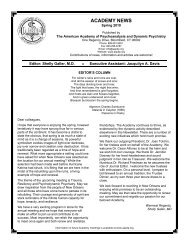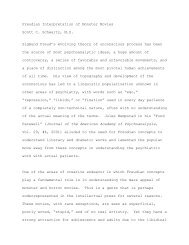ACADEMY FORUM - The American Academy of Psychoanalysis and Dynamic ...
ACADEMY FORUM - The American Academy of Psychoanalysis and Dynamic ...
ACADEMY FORUM - The American Academy of Psychoanalysis and Dynamic ...
Create successful ePaper yourself
Turn your PDF publications into a flip-book with our unique Google optimized e-Paper software.
An Italian Commemoration <strong>of</strong> Jules Bemporad<br />
by Marco Bacciagaluppi, M.D.<br />
Read at the 13th AAPDP-OPIFER Joint Meeting<br />
Rome, November 12-13, 2011<br />
Jules was a dear friend <strong>of</strong> mine <strong>and</strong><br />
a stimulating intellectual partner.<br />
In this short commemoration, I<br />
shall not attempt to speak <strong>of</strong> all<br />
his many achievements, but shall<br />
limit myself to some personal<br />
recollections. I shall mention two<br />
<strong>of</strong> his scientific contributions with<br />
which I was particularly involved.<br />
I first met Jules in New York<br />
City in 1963, nearly fifty years<br />
ago. I went there as Clinical<br />
Fellow <strong>of</strong> New York Medical College to study with Silvano<br />
Arieti who was then Pr<strong>of</strong>essor <strong>of</strong> Clinical Psychiatry at the<br />
College – a position which Jules himself would later occupy.<br />
Together with my wife I attended all the lectures <strong>of</strong> the firstyear<br />
residency course, as well as many other lectures, <strong>and</strong> Jules<br />
was one <strong>of</strong> the first-year residents. When we first arrived we<br />
stayed at the Hotel Paris in the Bronx. <strong>The</strong>n we met Jules, who<br />
was very friendly, <strong>and</strong> suggested that we move to a residential<br />
hotel, the Greystone – now no longer existing – on Broadway<br />
<strong>and</strong> 91st Street where his parents were also staying. This proved<br />
to be a very helpful suggestion. From there, every morning we<br />
used to take a very convenient cross-town bus on 96th Street to<br />
the Metropolitan Hospital where the lectures took place. Jules<br />
showed his brilliant intellect in his comments at the lectures,<br />
the case conferences <strong>and</strong> the Journal Club, conducted by Arieti.<br />
Like his cousin, Arieti, when he used to speak to us in Italian,<br />
Jules would display his beautiful Tuscan accent, which he had<br />
retained from his country <strong>of</strong> origin.<br />
After we returned to Italy, I kept up a correspondence with<br />
Jules for many years, until shortly before his death this year. I<br />
cooperated in making him come to Milan as Visiting Pr<strong>of</strong>essor<br />
in the Department <strong>of</strong> Psychiatry where I had studied. After he<br />
published Severe <strong>and</strong> Mild Depression, his joint book with Arieti<br />
(Arieti, S. & Bemporad, J., 1978, Severe <strong>and</strong> Mild Depression.<br />
<strong>The</strong> Psychotherapeutic Approach. New York: Basic Books.<br />
Italian translation by M. Bacciagaluppi <strong>and</strong> M. Bacciagaluppi<br />
Mazza: La depressione grave e lieve. L’orientamento<br />
psicoterapeutico. Milano: Feltrinelli, 1981), my wife <strong>and</strong><br />
I translated it into Italian. In this book, Silvano <strong>and</strong> Jules<br />
alternated chapters. In my opinion, among his many valuable<br />
contributions to this book, an important one is the second part <strong>of</strong><br />
Chapter 16, where Jules compares anthropological data on two<br />
cultures, the Eskimos <strong>and</strong> the Hutterites. <strong>The</strong> Eskimos “believed<br />
in total sharing <strong>and</strong> equality” (p, 390). “<strong>The</strong> Eskimo baby was<br />
welcomed into the tribe as the return <strong>of</strong> a departed loved one.<br />
He was satisfied in every way, even being nursed on dem<strong>and</strong><br />
until four years <strong>of</strong> age” (ibid.).<br />
<strong>The</strong> Hutterites, on the contrary, are “a highly puritanical <strong>and</strong><br />
duty-oriented community which has been found to have an<br />
extremely high rate <strong>of</strong> depressive disorders.” (p. 391) Families<br />
have ten to twelve children. Jules suggests that the different<br />
incidence <strong>of</strong> depression in these two cultures is due to their<br />
different socio-economic basis, with the resulting differences<br />
in child-rearing patterns.<br />
In 1980 he recommended I should read Humankind, by Peter<br />
Farb. I found this a very useful book, which called my attention<br />
to the importance <strong>of</strong> the agricultural revolution in our history.<br />
When Jules was Editor <strong>of</strong> the Journal <strong>of</strong> the <strong>Academy</strong>, from<br />
1992 to 2001, I published some papers <strong>of</strong> mine in the <strong>Academy</strong><br />
Journal. In 1998 I was Guest Editor <strong>of</strong> a Special Section on<br />
“Contemporary <strong>Psychoanalysis</strong> in Italy.” In 1999 a Special<br />
Section on Arieti appeared, with contributions from both <strong>of</strong><br />
us. In 2001 I was struck by a paper on “<strong>The</strong> Complexity <strong>of</strong><br />
Evil”, which Jules published on the Journal <strong>of</strong> the <strong>Academy</strong><br />
(Bemporad, J., 2001, <strong>The</strong> Complexity <strong>of</strong> Evil. Journal <strong>of</strong> the<br />
<strong>American</strong> <strong>Academy</strong> <strong>of</strong> <strong>Psychoanalysis</strong>, 29, 147-171). In this<br />
paper he reviews various studies <strong>of</strong> large-scale violence, ranging<br />
from Goldhagen’s discussion <strong>of</strong> anti-Semitism in Germany to<br />
Chang’s <strong>The</strong> Rape <strong>of</strong> Nanking. Jules finally uses Milgram’s<br />
famous experiment as a paradigm unifying these various<br />
examples. In Milgram’s study, as many will recall, experimental<br />
subjects were instructed to apply what they thought were painful<br />
stimuli to others, <strong>and</strong> to increase the stimuli, notwithst<strong>and</strong>ing<br />
the simulation <strong>of</strong> pain on the part <strong>of</strong> the alleged victims. Jules<br />
believes that two main factors characterize the behavior <strong>of</strong> the<br />
subjects: (1) the dehumanization <strong>of</strong> the other, <strong>and</strong> (2) obedience<br />
to authority (Bemporad, 2001, p. 169). This paper stimulated me<br />
to write a paper <strong>of</strong> my own on violence, which was published<br />
three years later, also on the Journal <strong>of</strong> the <strong>Academy</strong> (which<br />
by this time had become the <strong>Academy</strong> <strong>of</strong> <strong>Psychoanalysis</strong> <strong>and</strong><br />
<strong>Dynamic</strong> Psychiatry) (Bacciagaluppi, M., 2004, Violence:<br />
Innate or Acquired A survey <strong>and</strong> some opinions. Journal <strong>of</strong> the<br />
<strong>American</strong> <strong>Academy</strong> <strong>of</strong> <strong>Psychoanalysis</strong> <strong>and</strong> <strong>Dynamic</strong> Psychiatry,<br />
32(3), 469-481.).<br />
Finally, since 1999, Jules cooperated with Joan Tolchin in<br />
organizing the yearly Joint Meetings between the <strong>Academy</strong> <strong>and</strong><br />
OPIFER. This was for him a way <strong>of</strong> maintaining a link between<br />
his adoptive country <strong>and</strong> his country <strong>of</strong> origin. It is sad that he<br />
is not with us today, for the Thirteenth <strong>of</strong> these meetings, to<br />
which he contributed so much.<br />
13


